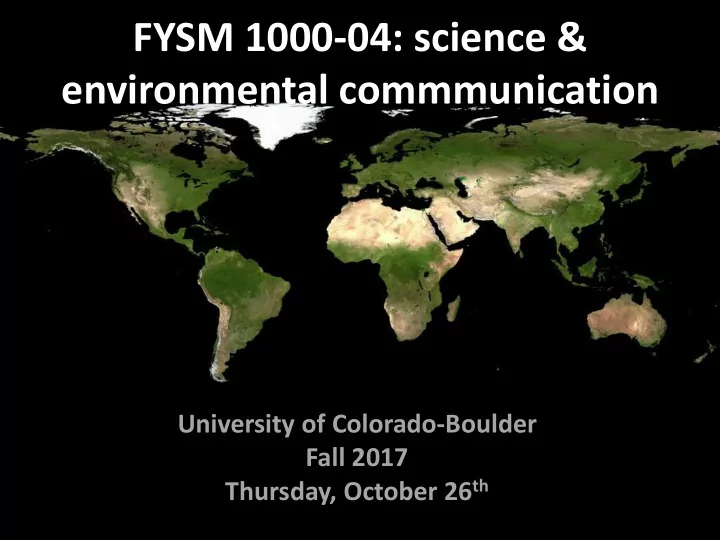

FYSM 1000-04: science & environmental commmunication University of Colorado-Boulder Fall 2017 Thursday, October 26 th Cooperative Institute for Research in Environmental Sciences 10/26/2017 UNIVERSITY OF COLORADO BOULDER and NOAA
today’s class (1) housekeeping & announcements (2) a short backgrounder (3) composition #2 in-class work time (4) co-facilitation #7 (Ryan & Lucas) Cooperative Institute for Research in Environmental Sciences UNIVERSITY OF COLORADO BOULDER and NOAA
the role of media media (n. pl ) (1)means of public communication reaching a large audience (2)publishers, editors, journalists, and others who produce, represent, interpret and disseminate information, through newspapers, magazines, television, film, (digital) radio, mobile phones and the Internet Cooperative Institute for Research in Environmental Sciences UNIVERSITY OF COLORADO BOULDER and NOAA
changing media landscapes “Few things are as much a part of our lives …a[n] instant historical record of the pace, progress, problems, and hopes of society.” ~ W. Lance Bennett (2002) traditional/legacy media (1) ‘ one-to- many’ (often one -way) communications (2) centralized ‘broadcast’ communication gatekeeping (3) influential content production dominant communication through television digital/new/social media (1) fundamental shift to ‘many to many’ interactive webs of communications (2) promotes interaction thru user-led decentralized communication (3) democratized content production blogs, Twitter, Tumblr, Reddit, Kapost etc. Cooperative Institute for Research in Environmental Sciences UNIVERSITY OF COLORADO BOULDER and NOAA
media attention to climate change over time Mann, Bradley & Hughes (1998) global media representations 2000 1200 1400 1800 1000 1600 RESONANT THEMES [external] : year • ecological/meteorological events and issues • scientific events and issues • Cooperative Institute for Research in Environmental Sciences cultural events and issues UNIVERSITY OF COLORADO BOULDER and NOAA • political events and issues
examining media representational practices Media & Climate Change Observatory (MeCCO) global trends: 2007: IPCC AR4 2009: COP15, ‘climate - gate’ 2013-4: IPCC AR5 2015-2016: COP21 Paris, ratifications updated monthly at http://sciencepolicy.colorado.edu/media_coverage/ Cooperative Institute for Research in Environmental Sciences UNIVERSITY OF COLORADO BOULDER and NOAA
examining media representational practices Media & Climate Change Observatory (MeCCO) US domestic trends: 2001: Bush & Kyoto Protocol 2014-2016 : ‘Clean Power Plan’, Pope actions 2017: Trump administration actions updated monthly at http://sciencepolicy.colorado.edu/media_coverage/ Cooperative Institute for Research in Environmental Sciences UNIVERSITY OF COLORADO BOULDER and NOAA
examining media representational practices Media & Climate Change Observatory (MeCCO) a Caution on : Fos ossils ils amon ong Us MORE attention ≠ MORE public understanding/clarity Cooperative Institute for Research in Environmental Sciences UNIVERSITY OF COLORADO BOULDER and NOAA updated monthly at http://sciencepolicy.colorado.edu/media_coverage/
climate risk management: much ado about what to do… CARBON ECONOMIES - carbon-based energy generation is central (e.g. coal, oil, natural gas) - incentive schemes support carbon-based economies (e.g. subsidies, tax relief) - associated effects of anthropogenic climate change, pollution, oil geopolitics ‘NEW’ CARBON ECONOMIES • decarbonization of industry and society (e.g. greater efficiencies; mode-switching to renewable energy generation) • incentive schemes (e.g. taxation, net metering, feed-in tariffs, cap-and-trade) • diminished contributions to anthropogenic climate change, air pollution etc. • introduction of multi-scale agreements to promote policy cooperation Cooperative Institute for Research in Environmental Sciences UNIVERSITY OF COLORADO BOULDER and NOAA Popovich (2017)
meeting people ‘ where they are’ on climate change “ We…must stop viewing global change as yet another opportunity to apply our existing tool kit. We must view the problems of global change as an opportunity to better recognize the limitations of current tools, and as a test bed in which to develop new formulations and analysis methods ” ~ Mike Hulme (2009, p. 279) Cooperative Institute for Research in Environmental Sciences UNIVERSITY OF COLORADO BOULDER and NOAA
the hatchet & the seed: engagements in the 21 st century “…if things are made rather than found, then the possibility exists for them to be unmade , or made differently.” ~ Stephanie Rutherford • carefully consider audience • emphasize solutions • bring climate impacts ‘home’ • tell meaningful stories • approach contrarianism carefully • make behavior change easy integrate lessons from research insights on what works, what doesn’t work, how, why, when and in what contexts Cooperative Institute for Research in Environmental Sciences UNIVERSITY OF COLORADO BOULDER and NOAA
conditions of engagement in the 21 st century opportunities and challenges CHALLENGES (1) smartening up, not ‘ dumbing down ’ climate change conversations (2) climate change communicators are talking more than listening "Paradoxically, there’s an urgent need to slow down – and think" (Philip Smith and Nicolas Howe, 2015: 207) OPPORTUNITIES (1) there is more recognition now regarding the importance of communication research in various contexts (2) there is high participation from young scholars/people Cooperative Institute for Research in Environmental Sciences UNIVERSITY OF COLORADO BOULDER and NOAA
for Tuesday conversation #1 A.watch the LOCC post. B.create your post Items to cover in your post: 1. i ntroduce yourselves (name, hometown, major (if you’ve declared something) 2. tell the LOCC group what the communication topic is for your composition 3. tell the LOCC group what the communication goal/objective is for your composition Cooperative Institute for Research in Environmental Sciences UNIVERSITY OF COLORADO BOULDER and NOAA
storyboarding Cooperative Institute for Research in Environmental Sciences UNIVERSITY OF COLORADO BOULDER and NOAA
Recommend
More recommend